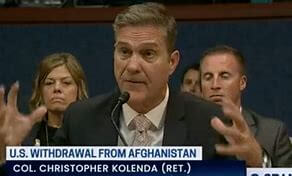By: Micaela Burrow, Daily Caller News Foundation
A retired Army colonel said Thursday that the lack of a leader directing the military and State Department actions on the ground during the Afghanistan withdrawal created confusion and contributed to the perceived failures that marked the war’s end in 2021.
Republican Rep. Michael McCaul of Texas, at a Foreign Affairs subcommittee hearing on the Afghanistan withdrawal, said the Biden administration had yet answer his request for evidence of an evacuation plan, suggesting that perhaps none existed in the first place. The Biden administration said it accounted for all possible contingencies, but the high-ranking colonels who commanded in Afghanistan testified to Congress that the administration chose an inferior course of action that failed to account for the Taliban’s catapult toward Kabul.
“There’s nobody functionally in charge of our wars on the ground” Retired Col. Christopher Kolenda, a combat leader in Afghanistan who participated in the Doha negotiations with the Taliban, told the panel.
While the President and National Security council made decisions from Washington, the military, State Department and other U.S. organizations worked on the ground without anyone directly negotiating between them, Kolenda said. These “bureaucratic silos” created problems during the evacuation.
“I have not seen an evacuation plan,” McCaul said. “Nobody knows who’s really in charge because there was no plan in place.”
U.S. Central Command provided a selection of plans to senior commanders, and Generals Mark Milley, Austin Miller and Kenneth McKenzie recommended not to withdraw until conditions were met, Retired Col. Seth Krummich said. However, civilian leaders in Washington rejected evacuation recommendations given by the generals in charge of the military dimension of the withdrawal.
“The discussions were going on at this high level,” Krummich, who was serving as Chief of Staff at Special Operations Command-Central at the time of the withdrawal, told Congress.
Regardless, he said the units on the ground responsible for carrying out any non-combat evacuation operation did not have the time or bandwidth to plan and rehearse a comprehensive evacuation operation.
Just five months transpired between the Biden administration’s decision to proceed with the full military withdrawal and the Sept. 11 deadline.
The lack of a clear plan led to the chaos, McCaul, who chairs the full House Foreign Affairs Committee, argued.
“Our efforts to apply these lessons, focused on improved communications, resources, and preparedness, have strengthened our response to the full range of crises,” a State Department spokesperson told the Daily Caller News Foundation.
McCaul said he was disturbed to hear that a sniper had a line of sight on the man who conducted a suicide bombing at Abbey Gate, killing 13 U.S. servicemembers. Sgt. Tyler Andrews-Vargas testified in march that he requested permission to shoot, but his immediate superior said he lacked the authority and didn’t know who would have been able to authorize engagement.
“The rules of engagement are confusing at best,” McCaul said. “If you saw a suicide bomber, would the rules of engagement provide that you could take out the threat as a defensive strike?” McCaul asked.
“If I saw the suicide bomber … I would absolutely kill that suicide bomber,” Krummich responded.
The National Security Council, White House and Pentagon did not immediately respond to the Daily Caller News Foundation’s requests for comment.
Related Story: State Department Had No Clear Leadership During Afghanistan Withdrawal, Report Concludes









